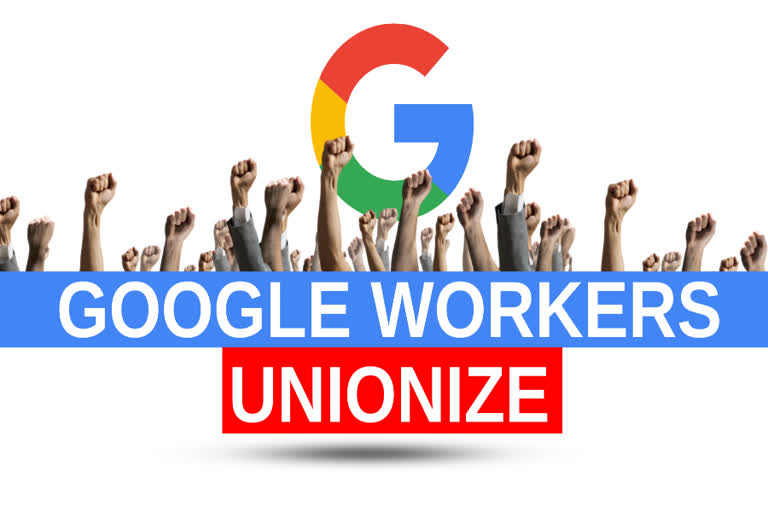Los Angeles Times: The new group of at least 227 engineers and other employees, called the Alphabet Workers Union after Google’s parent company Alphabet Inc., has been quietly in the works for about a year, people involved or familiar with its organization said. It has come together with support from the Communications Workers of America, a labor group representing about 700,000 workers that launched a campaign earlier this year aimed specifically at unionizing video game and tech companies in the U.S. and Canada.
The effort is unique not only because it is first-of-its-kind among big tech companies but also for its focus on what employees describe as the civic and ethical responsibilities of their employees — and the say that company workers should have in that. The new Alphabet Workers Union account posted on Twitter.
-
We're Alphabet workers. We’ve been organizing for over a year, & we’re finally ready to share why.
— Alphabet Workers Union (@AlphabetWorkers) January 4, 2021 " class="align-text-top noRightClick twitterSection" data="
This morning, we're announcing #AWU, the first union open to *all* workers at any Alphabet company.
Every worker deserves a union—including tech workers.https://t.co/m2Qmjwz32V
">We're Alphabet workers. We’ve been organizing for over a year, & we’re finally ready to share why.
— Alphabet Workers Union (@AlphabetWorkers) January 4, 2021
This morning, we're announcing #AWU, the first union open to *all* workers at any Alphabet company.
Every worker deserves a union—including tech workers.https://t.co/m2Qmjwz32VWe're Alphabet workers. We’ve been organizing for over a year, & we’re finally ready to share why.
— Alphabet Workers Union (@AlphabetWorkers) January 4, 2021
This morning, we're announcing #AWU, the first union open to *all* workers at any Alphabet company.
Every worker deserves a union—including tech workers.https://t.co/m2Qmjwz32V
“If your main motive is profit, you may not put ethical concerns as high as the profit motive. We want to serve as a counterbalance to that,” said Isaac Clerencia, a site reliability engineer in Google’s Mountain View, California, headquarters.
The group’s structure as a so-called minority union, representing a relatively small number of Google employees, means that the union cannot negotiate a contract, as is typical for unionized workers. Notably, it allows for the company’s part-time or contractor employees — who make up a vast portion of the Google workforce — to join alongside full employees, unlike in a traditional union.
Raine Serrano, a Google privacy software engineer in Seattle, said including subcontracted workers, sometimes called “a shadow workforce,” was a priority. These workers — who fill a range of roles, from serving meals in the cafeteria and cleaning offices, to writing code, handling sales, and managing teams — are employed through secondary companies, with little direct oversight of their pay and work conditions. “They need someone to fight for them,” Serrano said.
The new union held officer elections and established bylaws last month, CWA spokeswoman Beth Allen said.
In recent years, Google workers have protested — in some cases successfully — how the company has handled alleged incidents of sexual harassment, what employees describe as disparate treatment of contract workers, and some business decisions including contracts with the military or law-enforcement agencies.
“Yet problems persist,” the union said in its introductory posts on Twitter, citing alleged discrimination, harassment, and retaliation. “A few at the top are getting enormously rich while others see nothing of that wealth.”
A swell of walkouts and petitions related to race, inclusivity, and other issues have swept other tech companies too, with some of the loudest voices reverberating from Google. Until now, very few have voted to formally join a union.
“We’ve always worked hard to create a supportive and rewarding workplace for our workforce. Of course, our employees have protected labor rights that we support,” Google spokeswoman Kara Silverstein said in a statement. “But as we’ve always done, we’ll continue engaging directly with all our employees.”
Minority unions began in the industrial era as the first step to mobilize and channel workers’ discontent with a broader goal of gaining more power in the workplace, said Toby Higbie, a professor of history and labor studies at UCLA.
It will probably be difficult for employees in a company as large as Google to reach a critical mass of workers and hold elections for a traditional union straight away, he said. Workers at Walmart made a similar effort through a minority union a few years back that appears to have lost momentum, he said.
“These minority unions only pan out if they’re member-driven,” he said. “If people in the workplace see the organization as valuable to them as a representative, that’s the thing that will drive the union forward.”
In Google’s case, company employees and those familiar with the unionization effort say the group’s numbers grew last month after Timnit Gebru, a prominent artificial intelligence researcher and ethicist, said Google fired her after she challenged the company on its diversity hiring practices. The incident was a high-profile public blowout, with some employees coming to Gebru’s defense and asking the company for more transparency on the circumstances around what happened.
Clerencia, the Google engineer, said he became actively involved with the union after Gebru’s termination. He said the union aims to ensure Google behaves in an ethical way, both with its own workers and “society at large.”
©2021 Los Angeles Times.
Distributed by Tribune Content Agency, LLC.
Also Read: How Texas can become the next Silicon Valley



